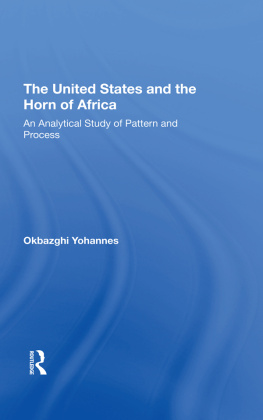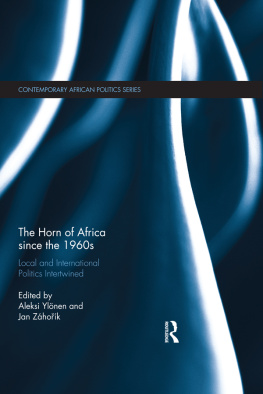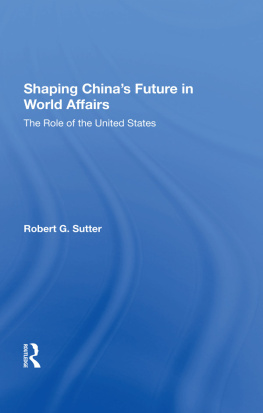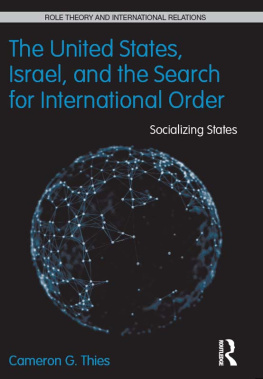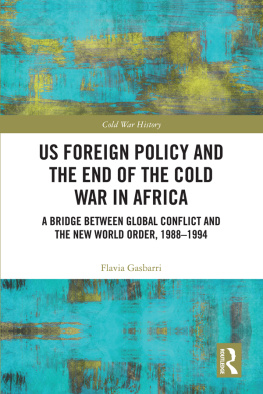The United States and the Horn of Africa
First published 1997 by Westview Press
Published 2019 by Routledge
52 Vanderbilt Avenue, New York, NY 10017
2 Park Square, Milton Park, Abingdon, Oxon OX14 4RN
Routledge is an imprint of the Taylor & Francis Group, an informa business
Copyright 1997 Taylor & Francis
All rights reserved. No part of this book may be reprinted or reproduced or utilised in any form or by any electronic, mechanical, or other means, now known or hereafter invented, including photocopying and recording, or in any information storage or retrieval system, without permission in writing from the publishers.
Notice:
Product or corporate names may be trademarks or registered trademarks, and are used only for identification and explanation without intent to infringe.
A CIP catalog record for this book is available from the Library of Congress.
ISBN 13: 978-0-367-29698-8 (hbk)
In memory of the unknown foot soldiers of democracy and progress in the African Horn
Contents
PART ONE
THE UNITED STATES AND ETHIOPIA
PART TWO
THE UNITED STATES AND ERITREA
PART THREE
THE UNITED STATES AND SOMALIA
PART FOUR
THE UNITED STATES AND THE SUDAN
Guide
Many people have, in different ways, contributed to the completion of this book. First and foremost, I owe a huge debt of gratitude to Carolyn Garner for her unfailing research assistance over the years. She has been a wonderful and caring friend and ally. Without her tireless efforts, this book would not have come to fruition.
Special thanks go to my longtime friend, Yohannes Woldemariam, whose intellectual support, moral encouragement, and witticism have nurtured the process of writing this book. He stepped up to the plate with his invaluable insights and advice whenever I needed them.
I wish to thank my graduate research assistants who diligently offered their services. I am particularly grateful to Michelle Graas for her energetic and able assistance. Her ruthless taking of the axe to the convoluted sentences and fragments have certainly improved the work. Many thanks also to Jodi Heintz, Dave Ellis, and Tony Buchanan for their excellent services.
I am also grateful to my colleagues and friends who read all or part of the manuscript and offered invaluable suggestions. Last, and by no means least, I owe a mountain of debt to my wife, Tamara, who was part of this work from start to finish.
Okbazghi Yohannes
The Cold War had unleashed powerful ethno-national and economic forces in the African Horn that proved to be uncontrollable. In the past these forces were contained by the combined actions of external and regional actors, and American participation in the containment of these forces was no doubt crucial. Americas role in regional politics has obviously continued into the current era, as demonstrated by its involvement in Somali affairs. Whether such action is a reflection of the residue of past obligations or suggests a redefinition of its role in world politics must be thoroughly examined. Dispassionate analyses and reinterpretations of American regional interests, priorities, options, and consequences should enrich the pedagogical coherence of our understanding of the structural relationship between American foreign policy and the politics of the African Horn. This work intends to fill that gap, but first a broad description of the paradigmatic imperative and scope of the work is in order.
Academic tradition suggests that American foreign policy may best be understood in terms of two contradictory orientations: isolationism and internationalism. Both are purportedly rooted in the belief that American values, institutions, experiences, and missions are unique and exceptional.
On the other hand, the dominance of internationalism at any particular moment of the nations history has pulled policy-makers in the opposite direction, as many have opined that the U.S. has a moral obligation to transform the international system through its active participation. This purportedly explains the outward thrust of American foreign policy in the past.moral and humanitarian considerations, rather than strategic and economic interests.
However, both descriptions offer less to our understanding of the intricacies of U.S. foreign policy and therefore do not contribute to an analytical or a historical understanding of this branch of study. In order to demystify American foreign policy, we must first compare this dominant paradigm with other interpretations in order to gain a fuller comprehension. A leading alternative paradigm posits that the nature and level of American capitalist development has been responsible for both inward and outward shifts in the nations foreign policymore simply, that U.S. foreign policy is structurally determined. An early articulator of an instrumentalist variant of this position, Charles Beard, pointed to the profound linkage between American foreign policy and the nature of the political economy of the nation. For him, the point of departure in American foreign policy involved the actual framing of the constitution itself. The original framers of the constitution were mostly property owners interested in commerce and manufacturing; accordingly, the constitution reflected their fundamental interests, which the government protected.
Thus the state, as the creation of the commercial class, not only declared the sanctity of private property but also defined the parameters of contractual obligations so as to ensure orderly transactions among competing special-interest groups within the commercial class. The strength of these interest groups was relational, i.e., the special-interest group that happened to dominate the economic and political scene of the nation at a particular moment had the capacity to influence, if not determine, state policy and action. It logically follows that, at the international level, the interests of this particular group coincided with the national interest and therefore came to shape American foreign policy.
Additional evidence for this interpretation of American foreign policy is supplied by David Gibbs in his comprehensive work on the political economy of U.S. intervention abroad. Gibbs powerfully argues and extensively documents claims that the Eisenhower and Kennedy administrations made differential responses to the Katanga problem as a function of their contradictory connections with competing corporate interests. For example, because the Eisenhower administration was largely staffed with individuals with strong ties to certain corporations, which in turn were linked financially to Franco-Belgian extractive firms in Katanga, the administration adopted an overt pro-Katanga policy. By contrast, Kennedys administrative appointees were tied to a different set of corporations, which were attempting to penetrate the Congo from a different direction. Consequently, the Kennedy Administration adopted a decidedly anti-Katanga policy, since the secessionist efforts in Katanga were deemed contrary to the aims of the new special-interest group.
Both the Hamiltonian conception of the national interest and the concrete policies pursued by the state throughout the nineteenth century provide sufficient empirical evidence for the instrumentalist argument. Alexander Hamilton
From Hamiltons views emerged the prescription that the primary responsibilities of the state were to provide subsidies and protection for domestic enterprises and to promote foreign trade. Consequently the state accorded American manufacturers generous subsidies and adequate protection against their European competitors. In fact, the U.S. became the first and most successful promoter of industrial capitalism through the judicious application of an import-substituting industrialization strategy.

